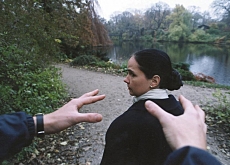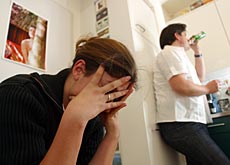Domestic violence victims face bed shortage

Victims of domestic violence in Switzerland are facing a severe shortage of beds in refuges for battered women, according to a study.
The country currently fails to meet the minimum number of places recommended by the Council of Europe – it should offer 980 beds but provides only 189.
Around a fifth of women in Switzerland experience sexual or physical violence during marriage or in a partnership, according to the first representative study into this issue, published in 1997. For some, the only way out is to leave the marital home and seek shelter elsewhere.
The latest study, carried out for the Federal Equality Office, looked at 15 of the 18 refuges situated in Switzerland and Liechtenstein. The majority of those in Switzerland are located in the German-speaking part of the country.
These 15 establishments offered a total of 65 rooms and 189 beds to battered women in 2003. Figures for 14 of the shelters show that sanctuary was offered to 1,375 women and children, who spent 41,000 nights within their walls.
Their total budget for that year was SFr10.7 million ($8.6 million), with an average of SFr7,300 being spent per person in care.
High demand
For Claudia Hauser, coordinator of the umbrella organisation of refuges in Switzerland and Liechtenstein, there are simply not enough beds to meet demand.
“Last year, there were 46,523 overnight stays; but the number of beds available could have been occupied twice over,” Hauser told swissinfo.
The Council of Europe said in 1997 that there should be one bed in a refuge available for every 7,500 inhabitants. According to this, Switzerland should offer 980 beds – 670 in German-speaking Switzerland, 260 in the French-speaking part and 40 in the Italian-speaking region.
Hauser says that Switzerland would not necessarily need so many places but that the current supply should be increased.
In 2004 820 women and 838 children sought shelter in Swiss refuges, Hauser revealed.
Tight finances
As to why there were not enough beds, Hauser said that both a lack of funds and knowledge were the main culprits.
“It has taken a long time for the cantons to acknowledge that domestic violence is a social and not a private problem; in addition, they were very careful with their money,” she said.
The refuges do not receive any funding from the government and are therefore dependent on the cantons in which they are located and on other financial means.
“Nearly all the shelters rely on donations, which means staff spend a lot of time and energy on securing contributions,” said Hauser, who is also head of a refuge in the Zurich Oberland region.
The actual cost of providing a bed for the night for women and their children varies from refuge to refuge.
“It depends on how large the house is, what services they can offer to women and other factors but costs [for the bed alone] could range from SFr120 to SFr260 per day,” Hauser said.
Two attempts were made in parliament to anchor funding for such shelters on a federal level – both failed in 1993 and 2003.
Iceberg tip
For Hauser, the cases that make it to a refuge are just the tip of the iceberg and domestic violence is a widespread problem in Switzerland.
“The women who come to us are from all kinds of background; it’s something that affects all women,” she said.
She added that some found it easier to ask for help than others. In her experience, an educated Swiss woman with her own money was quicker to reach out than a non-Swiss one who did not know where to go and was scared of losing her residence permit.
A non-EU national married to a Swiss or EU citizen residing in Switzerland risks being expelled from the country if she leaves her partner. This is a practice which was recently criticised by the Council of Europe’s Commissioner for Human Rights, Alvaro Gil-Robles.
Changing times
But the times are changing in Switzerland, if a little slowly.
Since April 1, 2004, an amendment to the country’s Criminal Code means that bodily harm, assault, threats, sexual coercion and rape within marriage or a heterosexual or homosexual relationship can be prosecuted.
Certain cantons are more ahead of the game than others. St Gallen was the first to introduce measures to keep a violent partner out of the marital home in 2003.
Other cantons have followed suit, such as Appenzell Outer Rhodes, Lucerne, Uri and Neuchâtel.
In St Gallen and Appenzell Outer Rhodes, 181 people were barred from their homes in 2003. More than 90 per cent were men. And in at least six per cent of cases, the women concerned went to stay in a refuge.
However, the cogs in certain cantons could move a little faster, according to Hauser, especially as the fallout from domestic violence makes a huge dent in the public coffers.
One study calculated that the total costs for the federal government, cantons and communes ran to at least SFr400 million annually. This covered health and therapy costs, police involvement and expenses related to prosecuting violent partners.
swissinfo, Faryal Mirza
According to the Council of Europe recommendations, Switzerland should have 980 beds on offer to victims of domestic violence in refuges.
The country offers only 189 beds.
In 2004, 820 women and 838 children sought shelter in Swiss refuges, amounting to 46,523 overnight stays.

In compliance with the JTI standards
More: SWI swissinfo.ch certified by the Journalism Trust Initiative



You can find an overview of ongoing debates with our journalists here. Please join us!
If you want to start a conversation about a topic raised in this article or want to report factual errors, email us at english@swissinfo.ch.